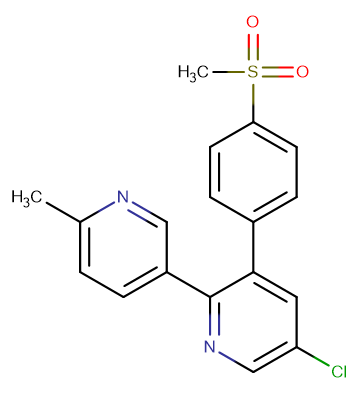
Etoricoxib
CAS No. 202409-33-4
Etoricoxib( L-791,456 | MK-0663 )
Catalog No. M13152 CAS No. 202409-33-4
Etoricoxib(MK-0663) selectively inhibited COX-2 in human whole blood assays in vitro, with an IC50 value of 1.1 ± 0.1 μM for COX-2 (LPS-induced prostaglandin E2 synthesis), compared with an IC50 value of 116 ± 8 μM for COX-1 (serum thromboxane B2 generation after clotting of the blood).
Purity : >98% (HPLC)
 COA
COA
 Datasheet
Datasheet
 HNMR
HNMR
 HPLC
HPLC
 MSDS
MSDS
 Handing Instructions
Handing Instructions
| Size | Price / USD | Stock | Quantity |
| 5MG | 31 | In Stock |


|
| 10MG | 45 | In Stock |


|
| 25MG | 65 | In Stock |


|
| 50MG | 92 | In Stock |


|
| 100MG | 140 | In Stock |


|
| 200MG | 235 | In Stock |


|
| 500MG | Get Quote | In Stock |


|
| 1G | Get Quote | In Stock |


|
Biological Information
-
Product NameEtoricoxib
-
NoteResearch use only, not for human use.
-
Brief DescriptionEtoricoxib(MK-0663) selectively inhibited COX-2 in human whole blood assays in vitro, with an IC50 value of 1.1 ± 0.1 μM for COX-2 (LPS-induced prostaglandin E2 synthesis), compared with an IC50 value of 116 ± 8 μM for COX-1 (serum thromboxane B2 generation after clotting of the blood).
-
DescriptionEtoricoxib(MK-0663) selectively inhibited COX-2 in human whole blood assays in vitro, with an IC50 value of 1.1 ± 0.1 μM for COX-2 (LPS-induced prostaglandin E2 synthesis), compared with an IC50 value of 116 ± 8 μM for COX-1 (serum thromboxane B2 generation after clotting of the blood).(In Vitro):Etoricoxib (MK-0663) is a selective and orally active COX-2 inhibitor, with IC50s of 1.1 μM, 116 μM and 5 μM for COX-2, COX-1 in human whole blood and purified human COX-2, respectively. Etoricoxib (MK-0663) shows inhibitory effect on PGE2 production by CHO (COX-2) cells (IC50, 79 nM), on purified human COX-2 with detergent (IC50, 4.1 μM), and on purified PGE2 production by U937 microsomes (low substrate; IC50, 12.1 μM). However, Etoricoxib (MK-0663) has little activity against COX-1 with a Ki of 167 μM. (In Vivo):Etoricoxib (MK-0663) (0.1-30 mg/kg, p.o.) dose-dependently inhibits carrageenan-induced paw edema, carrageenan-induced paw hyperalgesia, and endotoxin-induced pyresis in rats. Etoricoxib (≥10 mg/kg) completely reverses hyperalgesia response in the rat hyperalgesia model. Etoricoxib (MK-0663) (200 mg/kg/day) has no effect on urinary 51Cr excretion in rats, and nor in monkeys at 100 mg/kg/day. Etoricoxib (MK-0663) (50 and 100?mg/kg) potently increases the malondialdehyde (MDA) and myeloperoxidase (MPO) levels, and decreases the total glutathione (tGSH) and glutathione reductase (GSHRd) levels in rats. Etoricoxib (MK-0663) (100?mg/kg) significantly inhibits the decrease of NO in rats. Etoricoxib (MK-0663) (0.64 mg/kg, p.o.) reduces the features such as multiple plaque lesions, hyperplasia and dysplasia induced by 1,2-dimethylhydrazine dihydrochloride (DMH) in rats.
-
In VitroEtoricoxib (MK-0663) is a selective and orally active COX-2 inhibitor, with IC50s of 1.1 μM, 116 μM and 5 μM for COX-2, COX-1 in human whole blood and purified human COX-2, respectively. Etoricoxib (MK-0663) shows inhibitory effect on PGE2 production by CHO (COX-2) cells (IC50, 79 nM), on purified human COX-2 with detergent (IC50, 4.1 μM), and on purified PGE2 production by U937 microsomes (low substrate; IC50, 12.1 μM). However, Etoricoxib (MK-0663) has little activity against COX-1 with a Ki of 167 μM.
-
In VivoEtoricoxib (MK-0663) (0.1-30 mg/kg, p.o.) dose-dependently inhibits carrageenan-induced paw edema, carrageenan-induced paw hyperalgesia, and endotoxin-induced pyresis in rats. Etoricoxib (≥10 mg/kg) completely reverses hyperalgesia response in the rat hyperalgesia model. Etoricoxib (MK-0663) (200 mg/kg/day) has no effect on urinary 51Cr excretion in rats, and nor in monkeys at 100 mg/kg/day. Etoricoxib (MK-0663) (50 and 100?mg/kg) potently increases the malondialdehyde (MDA) and myeloperoxidase (MPO) levels, and decreases the total glutathione (tGSH) and glutathione reductase (GSHRd) levels in rats. Etoricoxib (MK-0663) (100?mg/kg) significantly inhibits the decrease of NO in rats. Etoricoxib (MK-0663) (0.64 mg/kg, p.o.) reduces the features such as multiple plaque lesions, hyperplasia and dysplasia induced by 1,2-dimethylhydrazine dihydrochloride (DMH) in rats.
-
SynonymsL-791,456 | MK-0663
-
PathwayChromatin/Epigenetic
-
TargetCOX
-
RecptorCOX
-
Research AreaInflammation/Immunology
-
Indication——
Chemical Information
-
CAS Number202409-33-4
-
Formula Weight358.84
-
Molecular FormulaC18H15ClN2O2S
-
Purity>98% (HPLC)
-
SolubilitySoluble in DMSO
-
SMILESO=S(C1=CC=C(C2=CC(Cl)=CN=C2C3=CC=C(C)N=C3)C=C1)(C)=O
-
Chemical Name5-Chloro-6'-methyl-3-[4-(methylsulfonyl)phenyl]-2,3'-bipyridine
Shipping & Storage Information
-
Storage(-20℃)
-
ShippingWith Ice Pack
-
Stability≥ 2 years
Reference
1.Capone ML, et al. Prostaglandins Others Lipid Mediat. 2007 Jan;82(1-4):85-94.
molnova catalog



related products
-
Paeoniflorin
Paeoniflorin is a herbal constituent extracted from the root of Paeonia albiflora Pall.
-
Mollugin
Mollugin may be a JAK2 inhibitor and inhibits LPS-induced inflammatory responses by blocking the activation of the JAK-STAT pathway.
-
Robenacoxib
Robenacoxib is a nonsteroidal anti-inflammatory drug (NSAID) used in veterinary medicine for the relief of pain and inflammation in cats and dogs.



 Cart
Cart
 sales@molnova.com
sales@molnova.com


